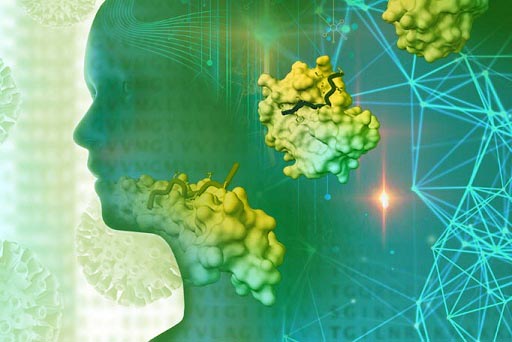Nikhil Prasad Fact checked by:Thailand Medical News Team Jul 24, 2024 1 year, 7 months, 1 day, 34 minutes ago
COVID-19 News: A Discovery with Potential Therapeutic Implications
Researchers from a consortium of prominent institutions have made a groundbreaking discovery about how COVID-19 causes severe inflammation in the lungs. The study, led by Dr Hung Caohuy and his team at the Uniformed Services University of the Health Sciences, Bethesda, Maryland-USA, reveals that the SARS-CoV-2 spike protein inhibits a critical signaling pathway, leading to heightened inflammatory responses. This
COVID-19 News report dives into the study's findings and their potential implications for future COVID-19 treatments.
 SARS-CoV-2 virus triggers airway inflammation by blocking CFTR protein
Image Credit: Rayne Zaayman-Gallant / EMBL
The Role of CFTR in Lung Health
SARS-CoV-2 virus triggers airway inflammation by blocking CFTR protein
Image Credit: Rayne Zaayman-Gallant / EMBL
The Role of CFTR in Lung Health
The cystic fibrosis transmembrane conductance regulator (CFTR) is a protein that plays a crucial role in maintaining the balance of fluid in the lungs. In healthy individuals, CFTR helps regulate the movement of chloride ions, which in turn controls the movement of water in and out of lung cells. This process keeps the airway surfaces hydrated, enabling the efficient clearance of mucus and pathogens.
In cystic fibrosis (CF) patients, mutations in the CFTR gene result in the production of a defective protein, leading to chronic lung infections and severe inflammation. Interestingly, the research team found parallels between CF and COVID-19, specifically in how both conditions trigger similar inflammatory pathways.
SARS-CoV-2 and CFTR: A Dangerous Interaction
The study hypothesized that the SARS-CoV-2 spike protein might inhibit CFTR signaling in a manner akin to CF. Using advanced techniques, including western blot and electrophysiological analyses, the researchers exposed normal airway epithelial cells to the spike protein. They discovered that this exposure led to a significant reduction in CFTR protein expression and activity.
"This finding presents evidence that the spike protein of SARS-CoV-2 can inhibit CFTR signaling, resulting in the activation of pro-inflammatory pathways," said Dr. Caohuy. The inhibition of CFTR caused by the spike protein led to the activation of TNFα/NFκB and ENaC signaling, both of which are associated with inflammation.
Implications for Long COVID and Potential Treatments
One of the most concerning aspects of COVID-19 is its long-term effects, known as Long COVID or Post-Acute Sequelae of SARS-CoV-2 infection (PASC). The study suggests that the sustained inflammation observed in Long COVID might be due to prolonged inhibition of CFTR by the viral spike protein.
The team also explored potential treatments to counteract this effect. Previous research had shown that cardiac glycosides like digoxin, digitoxin, and ouabain could block the interaction between the spike protein and its receptor ACE2. Consistently, the addition of these drugs in t
he study prevented the loss of CFTR protein and its channel activity.
Detailed Findings
The researchers used an organoid model of normal airway epithelia, differentiated at an air-liquid interface, to simulate the human lung environment. They found that when these epithelial cells were exposed to SARS-CoV-2 spike proteins, there was a marked loss of CFTR protein expression and function.
Moreover, they observed that this loss of CFTR led to the activation of both TNFα/NFκB signaling and ENaC. These pathways are known to drive the production of inflammatory cytokines and contribute to the pathological changes seen in COVID-19 patients' lungs.
The study also demonstrated that the spike protein disrupted the normal endosomal recycling process of CFTR, preventing its return to the cell surface and thereby exacerbating the loss of CFTR function.
Rescue by Cardiac Glycosides
Encouragingly, the study found that treatment with cardiac glycosides could rescue the CFTR protein from being degraded. These drugs, which are commonly used to treat heart conditions, were able to prevent the spike protein from binding to ACE2, thereby protecting CFTR from inhibition.
In experiments using authentic SARS-CoV-2 virus, the researchers confirmed that infection led to the same loss of CFTR protein. However, when the infected cells were treated with digitoxin or ouabain, CFTR levels were restored.
Potential Broader Impact
The findings of this study have significant implications not only for understanding the mechanisms of COVID-19 but also for developing new therapeutic strategies. By highlighting the role of CFTR inhibition in COVID-19-related inflammation, the research opens up new avenues for treating severe cases of the disease and possibly preventing Long COVID. This research also underscores the importance of exploring existing drugs with known safety profiles, like cardiac glycosides, to find new treatments for COVID-19.
The study findings were published in the peer-reviewed journal: Scientific Reports.
https://link.springer.com/article/10.1038/s41598-024-66473-4
For the latest
COVID-19 News, keep on logging to Thailand Medical News.
Read Also:
https://www.thailandmedical.news/news/apobec3-proteins-play-key-role-in-sars-cov-2-replication
https://www.thailandmedical.news/news/cd74-is-a-key-player-in-immune-response-and-covid-19-severity
